#andrei derevenko
Explore tagged Tumblr posts
Text

Maria, Anastasia, Alexei, Derevenko and Maria Vishnyakova, 1908.
#otma#romanov#maria nikolaevna#anastasia nikolaevna#alexei nikolaevich#andrei derevenko#maria vishnyakova
33 notes
·
View notes
Text
Romanov myths part two - did sailor nanny Derevenko betray the family?
Several members of the imperial entourage have been villainised over the decades, none more than Andrei Eremevich Derevenko, whom Anna Vyrubova claimed in her memoir to have betrayed the family. Many historians in the 20th century took this as fact, but more evidence has shown that it is highly likely that Derevenko did not betray the family or Alexei, and fell victim to one of the many lies in Anna Vyrubova's book. Some popular history books go as far as calling him 'abusive' - but let's look at the real facts.
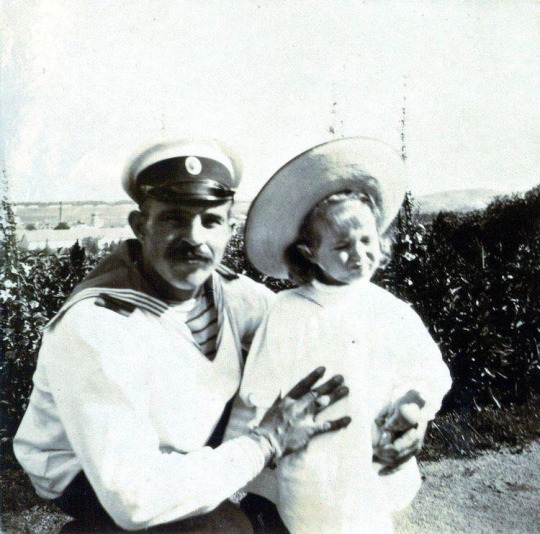
Andrei Eremevich Derevenko was born in 1878, in Volyn, Zhytomr, in the Ukraine. He was a member of the baltic fleet, originally a sailor before being employed by the Imperial Family. In May 1906 he was appointed as the Dyadka, meaning 'uncle', to Tsarevich Alexei Nikolaevich. Derevenko was a sailor nanny, his primary role was to look after Alexei, and to ensure that the haemophilliac did not do himself an injury.
Derevenko found himself in more favour with the family in 1907, when his actions during a collision of the yacht Standart with a large rock were seen as admirable. His experience as a sailor came in incredibly handy; he knew that the boiler rooms of the ship were most likely to sink first, so grabbed the tiny Heir and ran to the opposite side of the ship, ensuring the Tsarevich's maximum safety.
In 1910, he was paid 120 rubles a year annually. By 1913, this had increased to 360 a year. Derevenko was joined by another sailor nanny, Klimenty Grigorievich Nagorny, in 1913 to help protect the heir as he grew into a rambunctious boy. The Tsarevich especially enjoyed playing with Derevenko's sons, Sergei, Alexei, and possibly a third, Alexander. The Tsarina were the children's godmother, and in turn the Tsar and Tsarina paid yearly expenses for the boy's education, and covered the cost of a surgery one of them underwent. Derevenko kept a daily diary, where he mostly recorded the duties he performed for Alexei, and what they both got up to during the day.


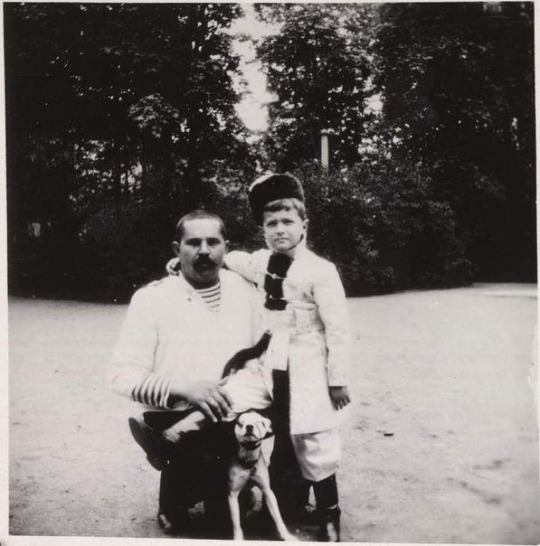
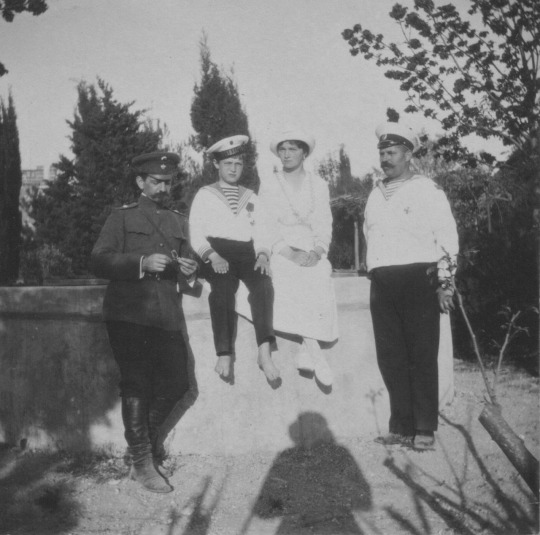
Now we come on to the origin of the myth. In her memoir, Anna Vyrbova claimed that after the February Revolution, she discovered:
"Lying sprawled in a chair was the sailor Derevenko, for many years the personal attendant of the Tsarevitch, and on whom the family had bestowed every kindness, every material benefit. Bitten by the mania of revolution, this man was now displaying his gratitude for all their favors. Insolently he bawled at the boy whom he had formerly loved and cherished, to bring him this or that, to perform any menial service his mean lackey's brain could think of. Dazed and apparently only half conscious of what he was being forced to do, the child moved about trying to obey. It was too much to bear."
Anna Vyrubova was arrested in March 1917, and did not spend the following months with the family at the Alexander Palace. She claims that this event happened on 20 March 1917. In contrast, family photo albums show that Derevenko was still a part of the retinue until the day of departure to Tobolsk, and was actually promoted in July 1917 by the Tsar to the role of Alexei's official valet.

Historian Charlotte Zeepvat proposes another explanation:
One of the most enigmatic figures, and the most intimately involved with Alexei, was the sailor Derevenko. Anna Virubova claimed to have seen Derevenko bullying Alexei, shouting orders at a boy too bemused to fight back. If this is true it would have been a shattering experience, but its truth is not so clear cut as it may seem. According to Anna, it happened on 20 March, two days before her own arrest. After a display like that the sailor would surely have left or been made to go, but he was still at the palace months later. Shortly before the move to Tobolsk in August he submitted an invoice for new clothes and shoes for Alexei to Colonel Kobilinski, the commandant of the palace garrison. He was asking a huge amount, so payment was withheld: when the sailor complained to the Tsaritsa and she intervened on his behalf, Kobilinski showed her the invoice. She took the Colonel's part. Derevenko was refused permission to accompany the family to Tobolsk, but months after their departure, he was still pleading to be allowed to join them. Failing that, he asked for the return of a trunk, which he said had gone to Tobolsk in error. It was found and opened, and inside were the new clothes and shoes, and an icon given to Alexei by his great-uncle, Grand Prince Sergei Alexandrovich. Was Derevenko stealing? Looking after the boy's interests in his own peculiar way? No one will ever know.
Several letters sent by Derevenko have survived. In the letters, he explains that the commissioners at the Alexander Palace and Tobolsk had informed him that there was 'no space' to take him on the trip, and that he was awaiting summons to Tobolsk, should he be required. Interestingly, these letters detail that the other sailor nanny, Nagorny, stayed in contact with Derevenko, and he also reveals that he was receiving multiple letters from the family and retinue from Tobolsk.
Historian George Hawkins, who has translated all of Alexei's correspondence and diaries from 1905-1918, found an interesting account by Comissar Pankratov. In this account, he explains that Colonel Kobylinski was confronted by Alexandra Feodorovna when Derevenko was not on the list, though was embarrassed when she discovered that he had requested a disproportionately high invoice to the Provisional Government for his duties. Pakratov added that Derevenko wrote to him repeatedly asking "when would he be called to Tobolsk to continue his official duties with the “heir”."
George Hawkins summarises: "Going by this account, it would seem he didn't [betray the Imperial Family]. Ania Vyrubova is the ultimate source for his 'betrayal' where she wrote that he started ordering Alexei about. I think something like that may well have happened, as it is also reported by Sokolov in his investigation into the fate of the Romanovs, but it would seem he still stayed with the family until their departure to Tobolsk - trying to get extra money out of the provisional government with his exaggerated bill, and kept trying to get to Tobolsk for some time."
The exact fate of Derevenko is unknown. Some sources suggest that he joined the White Army and died in 1921, either from being wounded/killed in action or succumbing to an illness. The early 1920s were years of intense turmoil and civil war in Russia, so it is not unusual that his documents drop off the record.
Though we can conclude that Derevenko did not betray the family in that he was 'abusive' to Alexei, he was not exactly popular with the suite. Pierre Gilliard recalled in his memoirs 'Thirteen Years at the Russian Court' that Derevenko preferred peasants to:
"[drop to their] knees before Alexis Nicolaïevitch to offer him what they had brought. I noticed that the boy was embarrassed and blushed violently, and when we were alone I asked him whether he liked seeing people on their knees before him. "Oh no, but Derevenko says it must be so !".
Gilliard also believes that the sailor nannies stifled Alexei's progress too much, and did not allow him to test the boundaries of his disease in order to become more self-disciplined.

Sources:
Memories of the Russian Court - Anna Vyrubova
Romanov Autumn - Charlotte Zeepvat
Russian Imperial Family: Romanovs in Their Own Words - Helen Azar and George Hawkins
Expenses of Alexey - Alexander Palace Org
Alexei - Russia's Last Tsesarevich: Letters, diaries and writings Part One: 1904 – 1915 - George Hawkins
Alexei - Russia's Last Tsesarevich: Letters, diaries and writings Part Two: 1916-1918 - George Hawkins
Photos:
Public domain, flickr - LastRomanovs
#myth busting#Romanovs#Alexei Nikolaevich#Tsarevich Alexei#myths#my own#Andrei Derevenko#Pierre Gilliard#Derevenko#Dyadkas#Nagorny#Klimenty Nagorny#russian history#romanov family#Anna Vyrubova#sources
41 notes
·
View notes
Text

Tsarevich Alexey Nikolayevich
Photographs of Tsarevitch Alexis Nicholaievitch of Russia, dressed in a sailor's suit. Between 5 and 14 June 1908, King Edward VII and his nephew-in-law, Tsar Nicholas II of Russia, with members of their families, met on board their yachts, the Victoria and Albert and the Standart, off Reval in the Baltic. The meeting had political significance, as Britain and Russia had signed a friendly agreement in 1907, but it was also a family party. These photos come from Queen Alexandra's Album. She had just gotten a new camera.
In the second photo, Alexey appears with his Dyad’ka (“Uncle”, or sailor nanny) Andrei Derevenko.

9 notes
·
View notes
Text
Fantasy Guide to Royal Children - Heirs and Spares
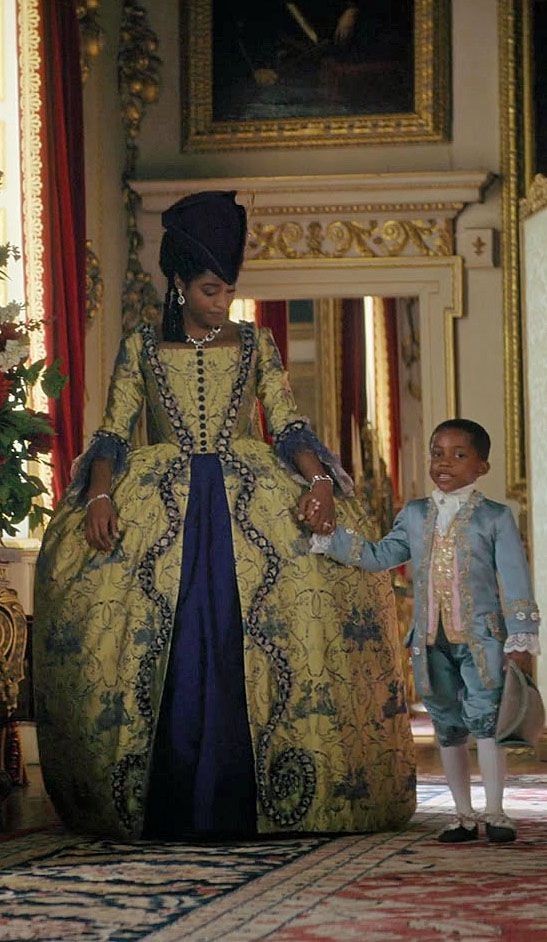
The lives of Princesses and Princes are of interest to most fantasy writers, it's where many of our heroes, side characters and antagonists hail from. But what is there life like? Is it always ballgrowns and servants? Or something more?
A Strict Order of Precedence

The first thing to know about royal children and siblings is that there's a very strict precedence of importance. Is it fair? No. But this is a system, it doesn't have to be fair. The heir comes first without argument. They are the most important child, they are always greeted first, they are the one to stand next to the monarch or their parents at occasions, they literally go first - and this doesn't change with age, if the heir is the youngest, they still have precedence over their siblings. After the heir, order of predence goes by age and the order effects the life of the children. For example, the older sister will marry begore any of her sisters. This order of deference will be so engrained in your character's life that they will believe it the norm and rarely question it, it probably won't spark any in-fighting.
Accommodation & Staff

Royal children are usually raised one of two ways. Either they are raised at court, in the same Palace as their parents or they are raised away from court under the care of trusted servants. Being raised away from their parents isn't a sign of remoteness or dislike or terrible parenting, it was a way of break a child into the constraints of royal life while giving them freedom of scrunity or danger. Usually these children are raised in the countryside for their health, as cities are usually cesspits for disease. Their parents would come to visit them or allow them to visit them at court. Children raised at court are raised with a higher level of scrunity and attention. They will be in the public eye.
Royal children will always be surrounded by staff. There will be nurses to wash and dress them, nannies to discipline and direct them, guards to protect them and usually, a guardian known as a governess to run their household and care for their needs. Staff are not allowed to hit royal children and must obey their commands. Some royal children were very close to their staff:
Kat Ashley and Elizabeth I
Baroness Lehzen and Queen Victoria
Klementy Grigorievich Nagorny and the Tsarevich Alexei Nikolaevich
Lala Bill and Prince John
However, some royal children faced neglect from their staff. George VI was abused by his nanny, who would pinch him during important occasions, openly favour his elder brother over him and deny him food, which many have been a cause of his speech impediment. After the Russian Revolution, another of the Tsarevich's nannies proved less loyal than the other. Andrei Yeremeyevich Derevenko abandoned his charge, but not before ordering the boy around and insulting him.
Day to Day Life

Royal children would be educated withing their home by tutors. They would usually take lessons all together (the heir may take other lessons). A royal child would recieve an education in languages, arithmetic, geography, etiquette, dancing, music, sports such as riding and literature. Sometimes they would even share lessons with the children of trusted nobles or their cousins. Only the heir will be taught statecraft and how to reign. There is no rhyme nor reason a spare would learn how to rule.
Some royal children are taught the value of their position. Many royal children will be raised strictly to adhere to their social standing and their place in it. Some children may be raised in isolation, kept from mingling and raised to think of themselves as higher than those around them. Some royal families preferred to raise their children as "normal" as possible. The last Romanov children slept in camp beds, with no pillows and we're expected to tidy their own rooms and help the servants. They didn't even use their proper titles, they were called by their names and given a tight monthly allowance to spend. Alexandra of Denmark and her sisters used to make their own clothes. Some royal children could even be encouraged to play with the children of servants and staff as well as nobility (Kolya Derevenko and Tsarevich Alexei Nikolaevich, Winifred Thomas and Prince John). Companionship was a great honour for noble and common child alike as sometimes, they would be invited to live or be educated alongside by the royal children.
Royal children will not undertake royal duties until they are of age. Younger children be be present for large scale events such as jubilees but would not be expected to partake in any duties themselves. When they are of age, they will usually be granted an annual allowance, be invited to social events, invited to be patrons of charities and participate in royal duties.
Heir Vs Spare
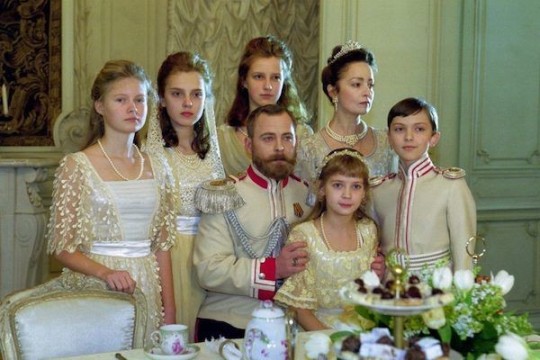
Heirs have more responsibility, all the prestige, more power but they have less freedom, less room to explore their own lives and be expected to always be the epitome of perfect. Heirs will be given responsibilities in government, sitting in on state meetings or undertaking state duties.
Spares have little in the way of real power but have the ability to live less regimental lives and gave more agency in their personal lives. Spares may act as ambassadors to other nations or undertake state visits on behalf of the monarchy or even take positions in the army. Spares are encouraged to find positions to support themselves outside the family, either in a marriage or undertaking some service to the country. Spares who stay in the country, tend to act as unofficial advisers to their sibling when they become monarch.
All Grown Up

When royal children grow up, there are usually certain expectations and limitations.
Heirs will be married quickly, the lineage must be secure. Heirs will usually marry either as part of a political alliance or marry somebody suitable - from a good family, the right background, and able to fit into a certain mould (i.e malleable, amiable and loyal). They will be expected to focus on the country, it's needs and support the monarch at all times. Their social circles will be scruntised, their every move will be noted and remarked upon. Heirs will never gave to worry about funding their lifestyle, the Crown is their job and it supports them.
Spares can marry or remain single if they choose, (but if the monarch instructs them go marry they must). Spares can travel, they can be idle, they can even persue amusements not permitted for the heir. Spares can win glory on the battlefield and mix with all sorts of people. That isn't to say spares are useless, spares often occupy very important spaces in society and government. Spares will usually take these positions not for just status but also for the pay. This is why spares are granted royal titles such as dukedoms (they can make money off the lands, be able to build a dynasty for themselves and their heirs and gain status).
#Fantasy Guide to heirs and Spares#Fantasy Guide to Royal Children#Fantasy Guide#write#writing#writeblr#writing resources#writing reference#writing advice#writers#writing advice writing resources#spilled ink#Writing reference writing resources#Writing resources writing reference#Writing advice writing reference#Writing advice writing resource#Royal children#Writing royal characters#Royalty#Writing royalty#Writing royals
3K notes
·
View notes
Text

Grand Duchess Olga Nikolaevna Romanov, Tsarevich Alexei Nikolaevich Romanov, Maria Ivanova Vishnyakova and Andrei Derevenko at Peterhof in 1907.
21 notes
·
View notes
Text

Tsarevich Alexei with Andrei Derevenko and his son.
10 notes
·
View notes
Text
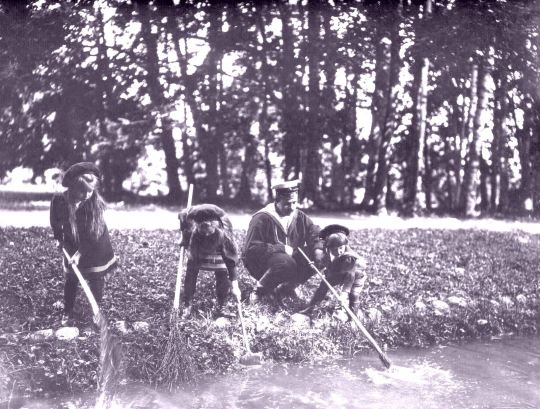
Grand Duchesses Maria and Anastasia Nikolaevna with their brother Alexei Andrei Derevenko at Tsarskoye Selo, 1907.
9 notes
·
View notes
Photo



Tsesarevich Alexei Nikolaevich, Grand Duchess Olga Nikolaevna, Grand Duchess Anastasia Nikolaevna, Grand Duchess Maria Nikolaevna and Andrey Eremeevich Derevenko in Tsarskoe Selo, January - March 1910.
Photos from: Grand Duchess Olga Nikolaevna's 1908-1910 Album / pages 31b + 32b, photos 601, 605 & 614
#1910#OMA#Alexei Nikolaevich#Olga Nikolaevna Romanova#Anastasia Nikolaevna Romanova#Maria Nikolaevna Romanova#andrei derevenko#Tsarskoe selo
40 notes
·
View notes
Photo

Tsarevich Alexei being carried by his attendant Andrei Derevenko
90 notes
·
View notes
Photo
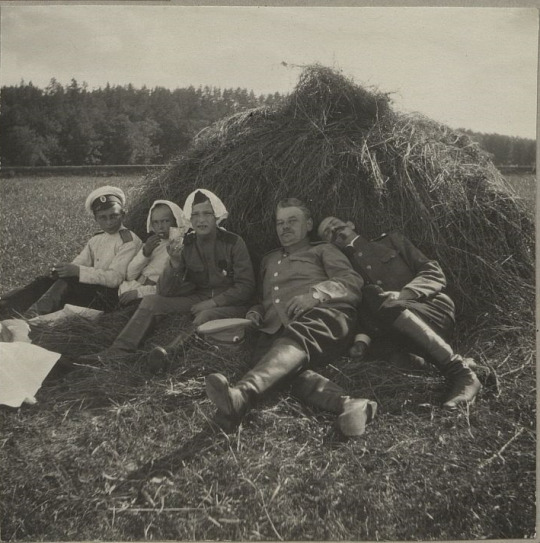
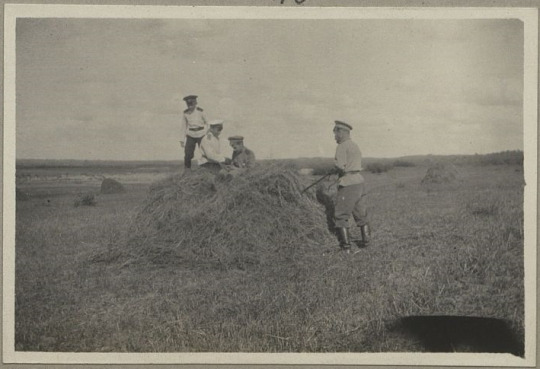
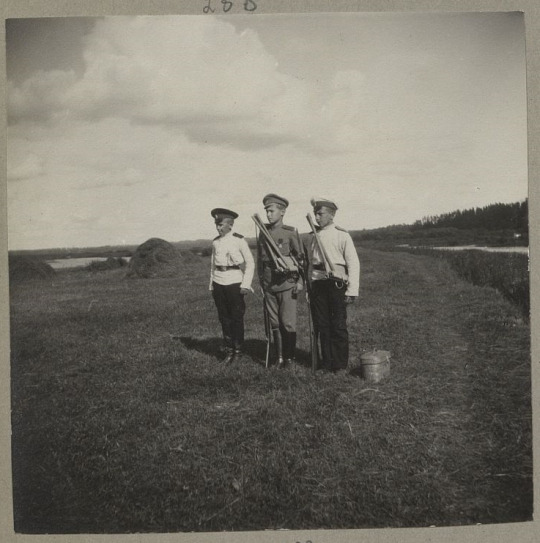

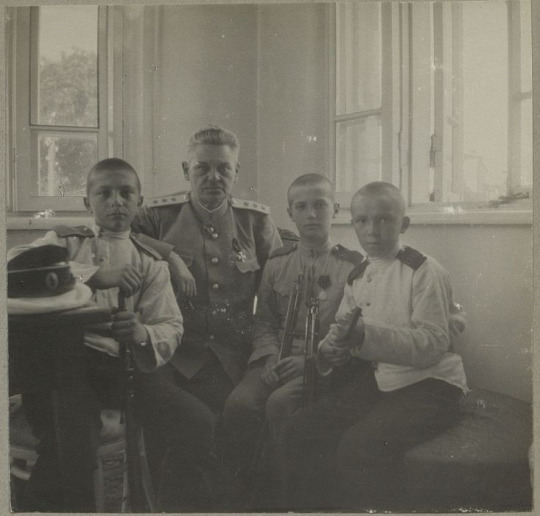
Cadets Evgeni Makarov and Vasili Agaev - Part VII (Continuation of the 1916-1917 Album of Grand Duchess Anastasia Nikolaevna) These five photographs come from the Album of Grand Duchess Anastasia Nikolaevna (Circa. 1916-1917). If one peruses through the albums (generously scanned by Ilya Grigoriev), you can see that copies of the same photograph were pasted into various albums belonging to the Grand Duchesses, as well as, Their Majesties. Cadets Makarov and Agaev (affectionately referred to as “Zhenya” and “Vasya” by the Tsesarevich, and his family), came to Stavka at Mogilev (General Headquarters) in mid-late Summer of 1916. In the Tsesarevich’s diary entries, his times spent at “HQ” were some of the happiest in his life. He felt the most freedom there as opposed to Tsarskoe Selo where he was surrounded always by “fussy women.” This is the end of photographs of the two boys, in the way of the Imperial Family’s private photograph albums. In other albums and funds (archives) are other photographs. I plan on sharing these too (though they probably have already been posted on here xD) - but I need some shut-eye! Good night everyone (actually, good morning!), hope you enjoyed this series of posts. ^_^ ________________________________________________________________ Photographs: 1. Tsesarevich Alexei Nikolaevich with Cadets Evgeni Makarov (left) and Vasili Agaev (far left), as well as, Petr Petrov (right) and Pierre Gilliard (far right).
2. Tsar Nicholas II (far right) with Cadets Evgeni Makarov (standing, left) and Vasili Agaev (sitting, infront of Cadet Evgeni Makarov), as well as, Tsesarevich Alexei Nikolaevich (center, next to Cadet Vasili Agaev).
3. Tsesarevich Alexei Nikolaevich with Cadets Evgeni Makarov (left) and Vasili Agaev (right).
4. Cadets Evgeni Makarov (right) and Vasili Agaev (left), as well as, Petr Petrov (next to Cadet Vasili Agaev) and Boatswain Andrei Derevenko (next to Cadet Evgeni Makarov).
5. Tsesarevich Alexei Nikolaevich with Cadets Vasili Agaev (left) and Evgeni Makarov (right), as well as, Petr Petrov (center, between Cadet Vasili Agaev and Tsesarevich Alexei Nikolaevich). ________________________________________________________________ Sources:
Альбом Анастасии Николаевны, 1916-1917 гг. Link of courtesy: https://www.flickr.com/photos/149552988@N02/albums/72157703990478911
#evgeni makarov#vasili agaev#simbirsk cadet corps#orlovsky-bakhtin cadet corps#tsesarevich alexei#alexei nikolaevich#imperial russia#photographs#1916#1917#russian archival material#ilya grigoriev#russian state archives#great wave#first world war#tribute post#romanov
62 notes
·
View notes
Text

Tsarevich Alexei Nikolaevich of Russia and his sailor nanny, Andrei Derevenko. Circa 1908-12.
57 notes
·
View notes
Text

Alexandra, Olga, Maria, Anastasia and Alexei with officers of the Standart. Derevenko on the far right.
#otma#romanov#olga nikolaevna#maria nikolaevna#anastasia nikolaevna#alexei nikolaevich#alexandra feodorovna#andrei derevenko#standart
21 notes
·
View notes
Note
hey i watched the last czars on netflix months ago. it was said that the palace kept alexei's illness a secret, it was being depicted the public never knew bout this until the family's death. but i watch a short clip on youtube showing the tsar and his wife walking in public in front of many commoner and beside them were alexei being carried by idk he looked like his personal nurse and i believed he wasn't rasputin. what do you think of this?
Hi! The Last Czars on Netflix isn’t historically accurate and when I watched I felt like it was more focused on romance than what actually happened in history. In real life, the palace did keep Alexei’s illness a secret to some extent. At first everyone that was not in the close Imperial Family thought that Alexei was just a normal child and thought nothing of him. But as he started to grow up and have more Hemophiliac attacks, people stated to notice that something was wrong with him. The YouTube clips that you watched were in 1913 when it was the Tercentenary of the Romanov Dynasty (300 years on the throne). Alexei had previously had one of the worst attacks he has ever had and was not fully back to normal when it was time for the Tercentenary. He was being carried by a Cossack soldier (who was definitely not Rasputin) because the imperial family didn’t want home to over exert himself. Alexei also did have Sailor Nanny’s (Andrei Derevenko and Klementy Nagorny) that basically were his full time babysitters. The family probably chose a Cossack because it looked more normal for a highly decorated soldier to carry the Tsarevich of Imperial Russia than a family friend sailor. And later during WWI there were several videos of Alexei that were released to the public to show that he was doing fine (he was really not fine because he had hemophilia). In conclusion, the public never knew his official diagnosis but they knew that he was sick.
2 notes
·
View notes
Text

Nicholas II and his son Alexei under house arrest at Tsarskoye Selo, 1917. The two sailors on the right are Klementy Nagorny and Andrei Derevenko.
6 notes
·
View notes
Text

Grand Duchess Olga Nikolaevna Romanov and Tsarevich Alexei Nikolaevich Romanov with Maria Ivanovna Vishnyakova and Andrei Derevenko at Peterhof in 1907.
10 notes
·
View notes
Text
Once Upon a December
read it on the AO3 at http://ift.tt/2w6AP7W
by BuruRaven
[More relationships, characters and tags to be added as soon as I finish writing this story.]
They told him they'd found him very early in the morning, standing still on the orphanage’s doorstep, not knowing who, when or where he was, clad in torn, but rich-looking clothes, covered in blood that wasn’t his and managing only a sparse, incoherent speech.
Have you ever wondered about Victor’s backstory? I have. You can also find this fic on my tumblr, here. English is not my first language.
Words: 1405, Chapters: 1/8, Language: English
Fandoms: Yuri!!! on Ice (Anime), Anastasia (1997)
Rating: General Audiences
Warnings: No Archive Warnings Apply
Categories: M/M
Characters: Victor Nikiforov, Katsuki Yuuri, Makkachin (Yuri!!! on Ice), Georgi Popovich, Yakov Feltsman, Okukawa Minako, Yuri Plisetsky, Nikolay Alexandrovich Romanov | Nicholas II of Russia, Alexei Nikolaevich Tsarevich of Russia, Yakov Yurovsky, Alix of Hesse | Alexandra Feodorovna, Anastasia Nikolaevna Romanov Grand Duchess of Russia, Maria Nikolaevna of Russia, Maria Feodorovna, Andrei Derevenko
Relationships: Katsuki Yuuri/Victor Nikiforov
Additional Tags: Alternate Universe, Alternate Universe - Anastasia (1997), Alternate Universe - Time Travel, It’s Basically Canon - I Just Filled Between The Lines, Fluff, Slow Build, Angst, Hurt/Comfort, Chapter Titles Are Loose Verses From The Songs Journey To The Past, And Once Upon A December From The Movie Anastasia, I’m Using Victor Instead Of Viktor Because The Wiki Says So, But Know That I Prefer Viktor 100 Times Over
read it on the AO3 at http://ift.tt/2w6AP7W
5 notes
·
View notes